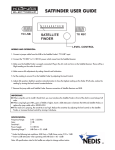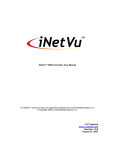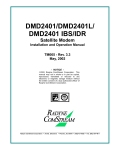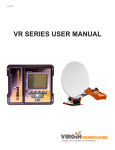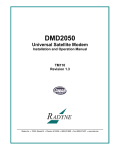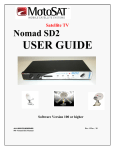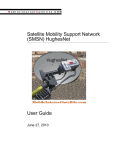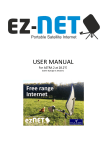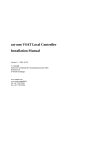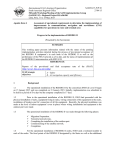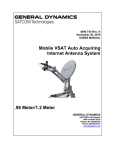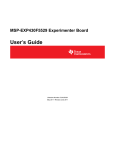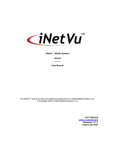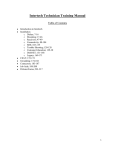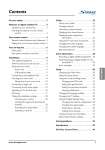Download Andrew Universal VSAT Transceiver
Transcript
Andrew Corporation Earth Station Electronics Universal VSAT Transceiver (UVT) User and Installation Guide August 2007 Version 2.0 Table of Contents 2 2 2 2 1. Introduction 1.1. Scope 1.2. Warnings 1.3 Disclaimers 3 3 2. The Universal VSAT Transceiver 2.1. Description 4 5 3. Transceiver & Feedhorn Assembly 3.1. Assembly 7 10 16 4. VIM/FReD Selection & Installation 4.1. VIM installation 4.2. Installing FReD 17 5. Operation & Maintenance 17 6. Site Owner Information Proprietary Notice: The technical data contained herein is proprietary to Andrew Corporation. It is intended for use in installation and maintenance of Andrew supplied equipment. This data shall not be disclosed or duplicated in whole or in part without the express written consent of Andrew Corporation. 1 1 Introduction 1.1. Scope This document is intended to provide information of a general nature to the supplier, installer and end user of the Andrew Universal VSAT (Integrated) Transceiver. It is highly recommended that this document is fully read and understood before installation and use of the transceiver. The Andrew transceiver is a professional product, which should only be specified and installed by professionals. It should not be relocated from its installed position except under the supervision of a professional. Observing these instructions will ensure that the Andrew transceiver offer many years of reliable service. 1.2. Warnings This Andrew Corporation transceiver is a professional product. It contains an RF transmitter. It is therefore a source of nonionizing radio frequency radiation. Qualified professionals with professional equipment are required to install and configure this unit. In case of emergency, disconnect the source of power for the transceiver. Usually this means disconnection of the indoor unit (or modem) from the power outlet. In addition to the risk of damage or degradation to the equipment, failure to observe any or all of the following instructions may result in bodily harm, serious injury or even death. For further safety information, see the chapter entitled Site Owner Information. 1.3 Disclaimers ANDREW Corporation disclaims any liability or responsibility for damage caused as the results of misprints in this manual. ANDREW Corporation disclaims any liability or responsibility for the results of improper or unsafe installation and maintenance practices. ANDREW Corporation disclaims any liability or responsibility for violation of any legal ETSI, FCC or regulatory system homologation requirements caused by the use of the UVT system components. 2 2 The Universal VSAT Transceiver 2.1. Description The Universal VSAT Transceiver (patent pending) allows the construction of a VSAT terminal regardless of the antenna/reflector or modem (IDU) being used. Included in the box set are the following items: • -F16X (integrated VSAT transceiver) • VIM10 (VSAT installation module) • FReD10 (Frequency reference device) • UFAK (Universal feed adaptor kit) • IFL cable • User Manual The installation of the UVT is summarized in the flow chart. A more detailed breakdown of the installation sequence is provided in the following sections. Select and attach appropriate feed horn adaptor and feed horn START Select correct interface (VIM, FReD or neither) according to modem type Where VIM is installed, set up correct switch configuration Complete the VSAT terminal installation process END Figure 1 Flow chart illustrating the UVT based ODU User Manual set-up process -F16X Transceiver VIM10 FReD10 IFL Cable 3 UFAK 3 Transceiver & Feedhorn Assembly IMPORTANT DO NOT connect the power source (the cables from the modem/indoor unit) before assembly of the transceiver and antenna is complete. The UVT box kit contains a UFAK – Universal Feed Adaptor Kit (pictured). Figure 2 UFAK - the Universal Feed Adaptor Kit By way of example the installation sequence below demonstrates the set up of the UVT with Andrew feedhorn and adaptor. The principal can be easily extended to the fitting of Prodelin or Patriot feed horns and adaptors. Before assembly of the transceiver electronics to the dish antenna, a feedhorn (and if necessary, adaptor) must be attached to the transceiver. Check the parts for damage, especially to the 3 interfaces (2 connectors and OMT port). Figure 3 Removal of the protective connector & port covers Removal of the adaptor kit from its plastic wrapper completes the preparation process. 4 3 Transceiver & Feedhorn Assembly UVT Type TX Power RX polarization X-Polar to TX RX Polarization Co-Polar to TX XR3 Series 2, 3 and 4 Watt Versions Yes No DR5 Series 3, 4 and 5 Watt Versions Yes Yes DR7 Series 6, 7 and 8 Watt Versions Yes Yes 3.1 Assembly The adaptor/transceiver interface may now be assembled. Figure 5 Transceiver & adaptor, showing correctly located adaptor ring With the adaptor sealing ring secured in the correct position, use the four screws supplied to connect the adaptor to the transceiver as shown in Figure 6. Figure 6 Connecting the adaptor to the transceiver Care should be taken not to overtighten hardware. 5 3 Transceiver & Feedhorn Assembly 3.1 Assembly The final task is to attach the feedhorn. At this point, it is important to note two things • The integrity of the sealing ring • The position of the skew angle indicator which is cast into the feedhorn body itself and used to ensure polarization alignment with the satellite Figure 7 The feedhorn/adaptor interface with adaptor ring Ensure that the sealing ring is in place. Orient the feed horn so that the zero degree skew indicator is aligned with the transmit polarization. (Polarization is marked on the transceiver). Attach the feedhorn to the adaptor/transceiver assembly. 6 3 Transceiver & Feedhorn Assembly 3.1 Assembly Figure 8 Connecting the feedhorn to the adaptor Care should be taken not to overtighten hardware. Depending on the particular modem and VSAT network set-up requirements, assembly of the transceiver and feed is now complete and is ready for integration with the antenna. 4 VIM/FReD Selection & Installation Included with the UVT are two system configuration devices. Deciding which to install depends on the modem being used. Some common L-band modems and manufacturers are listed in the following table. Use the table to identify which configuration should be used, then refer to the installation sections for more detailed information on how to set-up and connect the device. In the event that the specific modem is not listed, use VIM as the default installation device. 7 4 VIM/FReD Selection & Installation 10 MHz Reference Available On Modem RX If Port? 950 - 2150 MHz RX IF Input Bandwidth? No No No 4 No No Yes 1 No Yes No No Yes Yes Yes SatLabs IFL Switching Protocol (DC Level & 22 KHz Tone)? Configuration Example Modem Gilat SkyEDGE (XR Series Only) 1 HNS HX-150; ViaSat (Linkstar & Surfbeam); Advantech 2 Shiron iRG-Series; NDSatCom hlPerion 1 iDirect 3000-, 5000-, & 7000- Series; NDSatCom SkyWAN; Comtech EF; Radyne Radyne; Comtech EF No No Yes No Yes 1 Yes Yes No 1 Yes Yes Yes 3 STM-1910; HNS HX - 200 Configuration 1 Configuration 2 8 4 VIM/FReD Selection & Installation 10 MHz Reference Available On Modem RX If Port? 950 - 2150 MHz RX IF Input Bandwidth? No No No 4 No No Yes 1 No Yes No No Yes Yes Yes SatLabs IFL Switching Protocol (DC Level & 22 KHz Tone)? Configuration Example Modem Gilat SkyEDGE (XR Series Only) 1 HNS HX-150; ViaSat (Linkstar & Surfbeam); Advantech 2 Shiron iRG-Series; NDSatCom hlPerion 1 iDirect 3000-, 5000-, & 7000- Series; NDSatCom SkyWAN; Comtech EF; Radyne Radyne; Comtech EF No No Yes No Yes 1 Yes Yes No 1 Yes Yes Yes 3 STM-1910; HNS HX - 200 Configuration 3 Configuration 4 (XR Series Only) 9 4 VIM/FReD Selection & Installation 4.1 VIM Installation Installation and set-up may be achieved in a few simple steps. Note that your equipment provider may have already set-up the correct configuration prior to shipping of the unit, in which case, only the physical installation is required. VIM may be installed only in the outbound/receive path. Note also that both VIM and FRED form a permanent part of the installation. Removal of any or either of the devices after installation will alter the functionality of the receive path, and unless properly supervised, will likely result in the discontinuance of the terminal service. (Refer to Figure 9 – VIM-enabled terminal concept) TX TX Modem RX Indoor 1 Polarization Co Cross Reference Internal External VIM Band 10.70 - 11.70 10.95 - 11.45 10.95 - 11.70 11.20 - 11.70 11.70 - 12.75 11.70 - 12.20 11.70 - 12.45 12.25 - 12.75 Figure 9 VIM-enabled terminal concept 10 Transceiver 2 RX Outdoor 4 VIM/FReD Selection & Installation 4.1 VIM Installation The first step in the VIM installation process is to identify the correct switch positions for the application. START Select the 10 MHz Rx reference source Select band by configuring 3 switches (1,2 and 3). Select the required band/LO Select the required polarization (Co or X) END Only applies when used with DR series Universal Transceivers. XR series are X polar only. If the modem has a reference available on the RX port, it is recommended that this is used. Consult your modem specification See the look-up table to cross reference the switch position versus required LO. Some bands are “spectrally inverted”. Consult your modem user guide to see how the modem should be configured. Figure 10 Flow chart describing the VIM switch set-up IMPORTANT! Polarization setting for XR3 series must always be X-polar. VIM supply voltage for DR5 series must always be >18.5 V On cable runs of more than 30 meters, premium coax cable must be used with a solid copper center conductor. 11 4 VIM/FReD Selection & Installation 4.1 VIM Installation On the under side of the VIM unit, there is a rubber boot. Removal of this rubber boot allows access to the configuration switches. Figure 11 Locating the VIM configuration switches, rubber boot removed Up Down R P 1 2 3 Label Description R P 1 2 3 Switch Position Up Down Sets the VIM internal source of the 10 MHz reference Notes Modem Sets the Co-polar Cross-polar Applies only polarization to DR-series* Selects the LO/band See the band selection table * For all XR-series installations the “P” switch should be set down Figure 12 Switch layout and function table 12 4 VIM/FReD Selection & Installation 4.1 VIM Installation The 3 switches allocated to band/LO selection, are set-up according to the table. Example on left is configured for: Internal Reference: R is Up Up Down Co-Polar: P is Up Universal Low: 1 is Up 2 & 3 are Down R P 1 2 3 Name RF Input/GHz LO/GHz IF Output/MHz Switch# /Position Low High Low High 1 US Domestic 11.70 12.20 13.15 950 1450 down down up Euro-Low 10.95 11.45 12.40 950 1450 - 11.70 12.45 13.40 950 1700 Universal Low 10.70 11.70 9.75 950 1950 Universal High 11.70 12.75 10.60 1100 2150 - 11.20 11.70 12.65 950 Euro -High 12.25 12.75 13.70 950 - 10.95 11.70 950 12.65 2 Spectrum Inversion1 3 Yes down up down Yes down up up Yes up down down No up down up No 1450 up up down Yes 1450 up up up Yes 1700 up up down Yes In order to find the IF output from the UVT receiver/LNB, the following formula may be used. Where; intermediate frequency from VIM output to modem outbound transponder frequency local oscillator frequency setting on VIM Worked Examples Transponder frequency is 12.03 GHz. • Using the Universal High band (LO = 10.60 GHz), the transponder can be found at… 12.03 – 10.60 = 1.43 GHz • Using the US Domestic band (LO = 13.15 GHz), the transponder can be found at… 12.03 – 13.15 = -1.12 GHz = 1.12 GHz 13 4 VIM/FReD Selection & Installation VIM or FReD u Located indoors u Must be less u than .3 m from Modem Must not be covered or obstructed Modem u Located indoors u Less than .3 m from VIM or FReD INDOORS Coax Cable to Transceiver Transceiver Antenna Coax Cable to Modem OUTDOORS 14 4 VIM/FReD Selection & Installation 4.1 ViM Installation With the switches set-up according to the requirements, replace the rubber boot. The configured VIM may now be connected to the transceiver (and modem, if appropriate at this point), and installation of the terminal may now be continued. VIM has two connectors (Figure 13 - VIM, and the 2 labelled ports, “MODEM” and “RX”). Identify these ports, and ensure that “RX” is connected only to the outdoor unit, and that “MODEM” is connected only to the indoor unit (or modem). Figure 13 VIM, and the 2 labelled ports, “MODEM” and “RX” Installation of the electronics is now complete, switch on the modem and continue with the satellite terminal set-up process. When power is applied to the VIM module from the modem, a red LED will light to show the operation. On continuously indicates VIM is in frequency conversion mode. Double flash indicates VIM is in transparent mode. Single flash indicates VIM is not operating correctly 15 4 VIM/FReD Selection & Installation 4.2 FReD Installation Fitting the FReD ancillary is extremely simple. There are no configuration switches. The FReD device is fitted in the outbound/receive path, between the ODU/transceiver and the IDU/modem. Identify from the FReD module which is the “MODEM” (modem/IDU) port, and which is the “RX” (RX, ODU) port. (See Figure 14 - Illustration of FReD, with two labelled ports for an explanation.) Connect the FReD unit in line, between the modem RX port and the transceiver RX port. Figure 14 Illustration of FReD, with two labelled ports Installation of the electronics is now complete. Switch on the modem and continue with the satellite terminal set-up process. When power is applied to the FReD module, a blue LED will light to show the operation. 16 5 Operation & Maintenance The UVT transceiver operation is controlled by the modem. No operational intervention is necessary after installation is complete. If the network or system becomes unusable, it is unlikely that the transceiver is the source of the problem. Consult your network operator or service provider, or modem/indoor unit operating guide for instructions. The UVT transceiver is maintenance free. In the unlikely event of failure, the transceiver shall be professionally removed, replaced and disposed of. There are no user serviceable parts or components inside. Do not open the transceiver. 6 Site Owner Information Ensure that the site owner information sheet is handed over to those responsible for the installation site. It is important for the health and safety of the owner, and for the continued high performance of the system, that the information sheet is read and understood. The site owner safety sheet is depicted on the following pages. 17 6 Site Owner Information Do Take precautions to keep children and pets away from the installation site. Inspect from a safe distance, the installation after instances of severe weather (strong winds or extreme temperatures) or impact. If damage is suspected, disconnect the indoor unit or modem from the power outlet and seek professional advice. Don’t DO NOT Look into the feedhorn or waveguide. DO NOT Modify the approved feed horn and adaptor set-up. DO NOT Operate the device when not securely attached to the intended antenna installation. DO NOT Operate the device without a feedhorn. 18 6 Site Owner Information Don’t DO NOT Use a non-matched antenna/feedhorn/ adaptor combination. DO NOT Obstruct the area between the antenna and the transceiver. DO NOT Attempt to dismantle the unit – there are no user serviceable parts inside. DO NOT Attempt to service or modify the installation. DO NOT Attach any objects (heavy or otherwise) to any part of the installation. Avoid AVOID standing in front of the communications installation. AVOID continued operation of the installation, if damage to the antenna or transceiver has occurred or is suspected. 19 II-102147-EN © ANDREW Corporation 2007




















